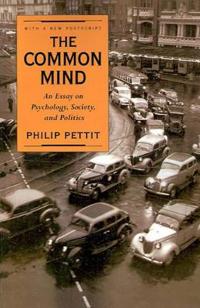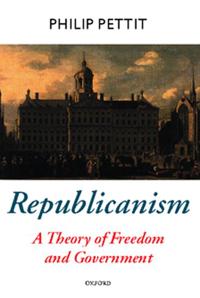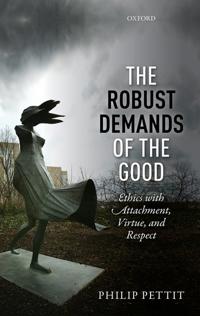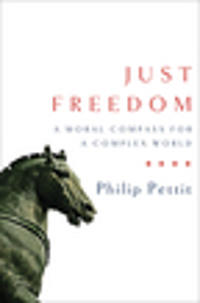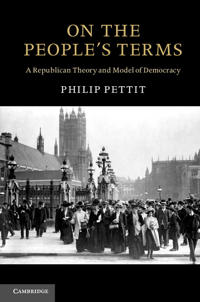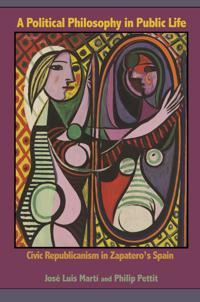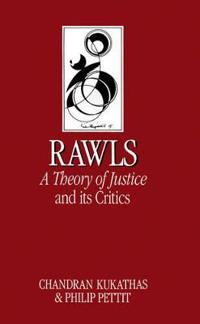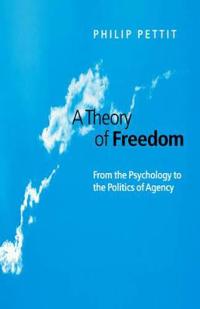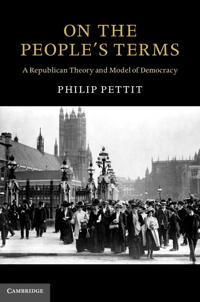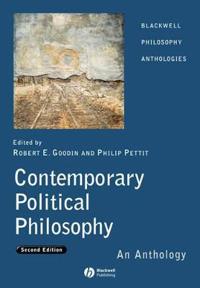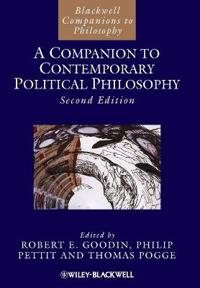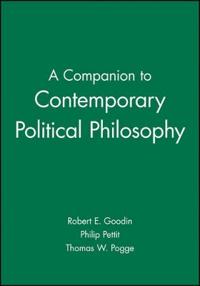The Common Mind (Häftad)
avPhilip Pettit
ISBN: 9780195106459 - UTGIVEN: 199604Pettit argues for an original way of marking off thinking subjects, in particular human beings, from other intentional systems, natural and artificial.[...]
Not Just Deserts: A Republican Theory of Criminal Justice (Pocket)
avJohn Braithwaite, Philip Pettit
ISBN: 9780198240563 - UTGIVEN: 1992-10-29Republicanism (Pocket)
avPhilip Pettit
ISBN: 9780198296423 - UTGIVEN: 200001This is the first full-length presentation of a republican alternative to the liberal and communitarian theories that have dominated political philosophy in recent years. The author's eloquent, compelling account opens with an examination of the traditional republican conception of freedom as non-do[...]
The Robust Demands of the Good (Inbunden)
avPhilip Pettit
ISBN: 9780198732600 - UTGIVEN: 2015-07Some goods that we generate for others, as when we give them attention or help or encouragement, require us to provide that benefit under the actual circumstances where we interact. Other goods that we generate require not just that we actually provide that sort of benefit but that we are also poise[...]
Mind, Morality, and Explanation: Selected Collaborations (Pocket)
avFrank Jackson, Philip Pettit, Michael Smith
ISBN: 9780199253371 - UTGIVEN: 2004-02-19Economy of Esteem, The: An Essay on Civil and Political Society (Pocket)
avGeoffrey Brennan, Philip Pettit
ISBN: 9780199289813 - UTGIVEN: 2005-12-15Group Agency: The Possibility, Design, and Status of Corporate Agents (Inbunden)
avChristian List, Philip Pettit
ISBN: 9780199591565 - UTGIVEN: 2011-04-07Group Agency (Häftad)
avChristian List, Philip Pettit
ISBN: 9780199679676 - UTGIVEN: 201304Are companies, churches, and states genuine agents? Or are they just collections of individual agents that give a misleading impression of unity? This question is important, since the answer dictates how we should go about explaining the behaviour of these entities and whether we should treat them a[...]
Just Freedom (Inbunden)
avPhilip Pettit
ISBN: 9780393063974 - UTGIVEN: 2014-04Freedom, in Philip Pettit's provocative analysis, "requires more than just being let alone". In Just Freedom, a succinct articulation of the republican philosophy for which he is renowned, Pettit builds a theory of universal freedom as non-domination. Seen through this lens, even societies that cons[...]
On the People's Terms (Häftad)
avPhilip Pettit
ISBN: 9780521182126 - UTGIVEN: 201212According to republican theory, we are free persons to the extent that we are protected and secured in the same fundamental choices, on the same public basis, as one another. But there is no public protection or security without a coercive state. Does this mean that any freedom we enjoy is a superfi[...]
Made with Words: Hobbes on Language, Mind, and Politics (Pocket)
avPhilip Pettit
ISBN: 9780691143255 - UTGIVEN: 2009-07-06A Political Philosophy in Public Life (Häftad)
avJose Luis Marti, Philip Pettit
ISBN: 9780691154473 - UTGIVEN: 201207This book examines an unlikely development in modern political philosophy: the adoption by a major national government of the ideas of a living political theorist. When Jos Luis Rodrguez Zapatero became Spain's opposition leader in 2000, he pledged that if his socialist party won power he would gove[...]
John Rawls' Theory of Justice and Its Critics (Häftad)
avChandran Kukathas, Philip Pettit
ISBN: 9780745602820 - UTGIVEN: 1990-09John Rawls' "A Theory of Justice" has been influential in philosophy, political theory, welfare economics and jurisprudence. This book is thought to be the first full-length study of Rawls' work. It provides a concise account of Rawls' central ideas, situates them within contemporary debates, and su[...]
A Theory of Freedom (Häftad)
avPhilip Pettit
ISBN: 9780745620947 - UTGIVEN: 200107This approach to freedom starts from an account of what we mean by describing someone as a free subject; develops an argument as to what it is that makes someone free in that basic sense; and then goes on to derive the implications of the approach for issues of freedom in political theory.[...]
On the People's Terms (Inbunden)
avPhilip Pettit
ISBN: 9781107005112 - UTGIVEN: 201301According to republican theory, we are free persons to the extent that we are protected and secured in the same fundamental choices, on the same public basis, as one another. But there is no public protection or security without a coercive state. Does this mean that any freedom we enjoy is a superfi[...]
Contemporary Political Philosophy: An Anthology, 2nd Edition (Inbunden)
avEditor:Robert E. Goodin, Editor:Philip Pettit
ISBN: 9781405130646 - UTGIVEN: 2005-11-30Contemporary Political Philosophy: An Anthology (Häftad)
avRobert Goodin, Philip Pettit
ISBN: 9781405130653 - UTGIVEN: 200508This authoritative collection of the seminal texts in post-war political philosophy has now been updated and expanded. * Reprints key articles, mainly unabridged, touching upon the nature of the state, democracy, justice, rights, liberty, equality and oppression. * Includes work from politics, law [...]
A Companion to Contemporary Political Philosophy: 2 Volume Set, 2nd Edition (Inbunden)
avEditor:Robert E. Goodin, Editor:Philip Pettit, Edi Pogge
ISBN: 9781405136532 - UTGIVEN: 2007-11-30A Companion to Contemporary Political Philosophy (Häftad)
avRobert E. Goodin, Robert E. Goodin, Philip Pettit
ISBN: 9781444350876 - UTGIVEN: 201203This new edition of "A Companion to Contemporary Political Philosophy" has been extended significantly to include 55 chapters across two volumes written by some of today's most distinguished scholars.New contributors include some of today's most distinguished scholars, among them Thomas Pogge, Charl[...]
Equity And The Law Of Trusts (Pocket)
avPhilip H. Pettit
ISBN: 9780199694952 - UTGIVEN: 2012-10-02This well-respected textbook, offering a traditional approach to equity and trusts, has been a trusted resource for academics and students for the last 40 years. It gives an exceptionally in-depth and thorough account of equity and trusts law, providing everything the student needs to understand the[...]
Great Expectations (Pocket)
avCharles Dickens, Philip Page, Marilyn Pettit
ISBN: 9780340871614 - UTGIVEN: 2003-10-31Using a text and a cartoon-strip format to link important passages, this work is part of the "Livewire Graphics" series, which brings to life the great classics, making them accessible to students of various abilities.[...]
A Companion to Contemporary Political Philosophy (Pocket)
avRobert E. Goodin, Philip (EDT) Pettit, Robert E. Goodin
ISBN: 9780631199519 - UTGIVEN: 1996-01An essential reference for anyone interested in this dynamic field, the new edition of A Companion to Contemporary Political Philosophy is the most current and comprehensive resource available.* Expanded second edition brings together fifty--five chapters on current thinking in political philosophy*[...]

